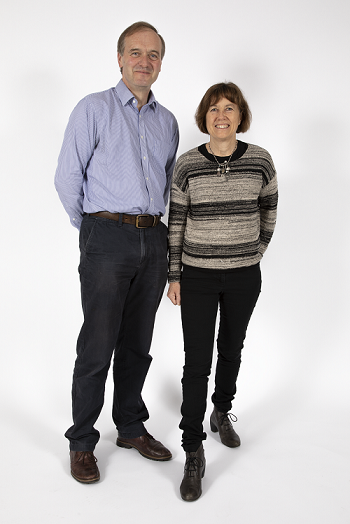 The Department of Physiology, Development and Neuroscience (PDN) is one of the largest department within the school of Biological Sciences. We took over as Joint Heads of Department from Professor Bill Harris in October 2018. We are long-serving members of the Department; Sarah Bray joined the Department of Anatomy in 1991 and Bill Colledge joined the Department of Physiology in 1995.
The Department of Physiology, Development and Neuroscience (PDN) is one of the largest department within the school of Biological Sciences. We took over as Joint Heads of Department from Professor Bill Harris in October 2018. We are long-serving members of the Department; Sarah Bray joined the Department of Anatomy in 1991 and Bill Colledge joined the Department of Physiology in 1995.
Sarah’s research is in the field of Developmental Biology; information about her pioneering work on cell signalling pathways that coordinate animal development and the implications of this for disease can be found here.
Bill’s research currently focuses on hypothalamic neural circuits involved in fertility and reproduction; information about his discovery and characterisation of a key protein involved in these functions can be found here.
Between us, we have previously served in PDN as heads of Research, Graduate Studies, and Enterprise as well as on numerous Departmental, University and external Committees. We are committed to leading PDN as it strives for excellence in research and teaching.
Here, we outline some of our key priorities for PDN over the next five years.
-
PDN has a long history of research innovation, including Nobel Prize winning scientists Sir Alan Hodgkin and Sir Andrew Huxley who first described the ionic basis of nerve cell electrical signalling, and Sir Bob Edwards who did pioneering work on in vitro fertilisation. We currently have active research programmes in Developmental Biology, Reproductive and Cellular Physiology, Neuroscience, Form and Function, and Anatomy. World-leading achievements in neuroscience are recognized by the Brain prize (Wolfram Schulz, 2017) and the Champalimaud Vision Award (Christine Holt 2016) and in developmental biology by the Waddington (Bill Harris, 2017) and Tickle Medals (Jenny Nichols 2017, Benedicte Sanson 2019). Recent breakthroughs in embryo culture (Magdalena Zoernicka-Goetz) and mini-placental organoids (Graham Burton and Margherita Turco) have generated widespread interest. We have a vibrant community of ~100 graduate students and ~100 postdoctoral research staff, and we are fortunate to have a good number of talented early career Research Fellows in PDN. A key goal for us is to ensure we support our graduate students, postdocs and early career Fellows and Lecturers in their career development, and to help keep established academic staff research-active.
-
Anatomy and Physiology in Cambridge was ranked first in the QS World University Rankings 2019, reflecting the talent and dedication of the academic and support staff in PDN. PDN contributes to the Part I undergraduate teaching of five Medical Student courses, six Vet Student courses and three Natural Science student courses; we offer our own Part II PDN course and contribute to two interdepartmental Part II courses. Our undergraduate student feedback reflects the high standard of teaching and the expertise and commitment of our teaching and support staff. A key goal for us is to support our staff in maintaining this high quality teaching by encouraging course management and development, recruiting and training new lecturers, and providing on-going support for existing University Teaching Officers.
-
PDN is proud of our staff gender balance, with 51% of Research staff, 43% of all tenured academics, 56% of Professors, 51% of contract researchers and 71% of support staff being female. We strive to achieve and promote equality and diversity, aided by the PDN Wellbeing Committee. We have zero tolerance of discrimination, bullying or harassment of any kind, and any member of staff or students concerned about these issues should talk to us, the Departmental Administrator or one of our PDN Wellbeing Advocates and Ambassadors.
-
PDN is committed to reducing the environmental impact of the department: we ask everyone to work in a resource-efficient way, from switching off lights and equipment when they're not needed, to recycling, and choosing environmentally friendly modes of transport whenever possible. We applaud the work of our prize-winning
PDN Green Team.
As Joint Heads of Department we play a pivotal role in supporting research and developing teaching strategy to help ensure we maintain this high standard. Our joint HoD manifesto can be found here.

